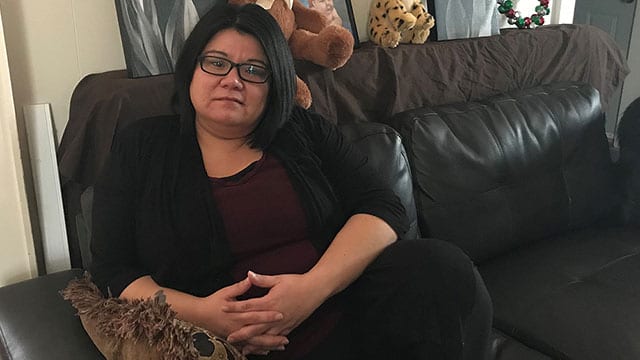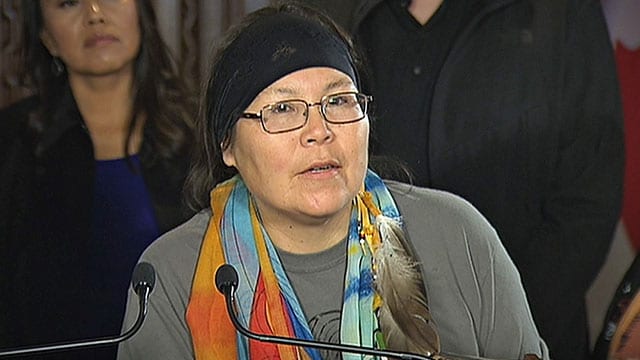APTN Investigates
Sixties Scoop survivors will have a lot more to think about now that the proposed $750 million settlement agreement-in-principle has become public.
As was the case with the Indian Residential Schools Settlement Agreement (IRSSA), the question now will be whether the clients’ best interests will be served and whether they will be provided with enough information to protect their own interests.
Lawyers across the country are competing to sign up clients. Four large firms have taken court action to keep the entire Sixties Scoop matter for themselves. Other law firms want in and are also fighting in court.
The four big firms – Merchant Law Group, Koskie Minskie, Wilson Christen, and Klein Lawyers – have worked out the agreement-in-principle with the federal government. A handful of survivors appear to have played some role in the negotiations but they are not lawyers and the document released last weekend is a highly technical legal document.
As things stand right now, applicants must be able to check three boxes to be eligible for compensation under the settlement:
1) they must be registered Indians or Inuit or eligible for registration,
2) they must have been adopted or made a permanent ward
3) they must have been placed with non-Indigenous parents.
That means Métis and non-status Indians are not eligible and will not be compensated under this agreement.
The agreement-in-principle contains a clause that Sixties Scoop survivors who are eligible and decide to participate must release Canada from any further legal liability. And there is no equivalent of the Independent Assessment Process (IAP) in this agreement. The IAP was part of the IRSSA that allowed survivors to be compensated for serious physical and sexual abuse.
One lawyer, who did not want to be named, asked if clients were signing away their rights to sue provincial agencies that were responsible for them after they were taken into care. The lawyer said that if child and family service agencies had failed to seek restitution for children who were injured or abused during their time in care, those agencies could be liable for any lost compensation.
Lee McMillan of D.D. West LLP agreed.
“Why are these law firms sacrificing these victim’s rights to sue for those abuses”? he asked.

Tony Merchant of Merchant Law Group LLP, one of the four designated firms in the settlement and one of the lawyers who negotiated the terms of the agreement-in-principle, acknowledged that survivors accepting the settlement will give up their right to sue Canada.
He said the survivors are not giving up their right to sue anyone but the federal government by participating in this agreement.
“By operation of law they won’t be able to sue the government of Canada for anything in connection with Sixties Scoop. So they won’t be signing a paper. We will still be able to go to the provincial governments on their behalf, and Merchant Law intends to do that. But the case against the federal government for each of these recipients of money, it will come to an end,” he said.
Tony Merchant, Merchant Law Group LLP – Merchant and his team are one of four law firms designated to represent the plaintiffs and applicants for the Sixties Scoop class action lawsuit settlement.
The agreement-in-principle also states that if more than 2,000 eligible applicants opt out of the settlement, the whole agreement will be tossed out.
Schedule L, is a form in the agreement that is titled “Opt Out Form — Exclusion From Receiving Money” and it reminds readers often that they will not get any money if they opt out.
APTN Investigates asked Merchant if this settlement is the equivalent of a dangling a carrot for the poor and marginalized that may not compensate and remedy what happened to them in order to release the federal government from liability.
The Regina-based lawyer said this proposed class action settlement is only the beginning, not the end of dealing with Sixties Scoop matters.
“This only pays compensation for the loss of culture. It doesn’t pay compensation for what happened to people individually,” he said. “We’re trying to help people as best we can. So, is it enough? No. Is it significant? Yes. Is it possible we’ll get more? Yes. And we’ll be fighting to try to get more but, $25,000 to $50,000 that we hope people will start to be able to receive in about a year, it’s a substantial amount of money and we want to get that money into the hands of people.”
Schedule L also uses language that seems to leave some people questioning whether it also means they are agreeing to not sue Canada if they opt out — leaving some with the impression they are damned if they do and damned if they don’t.
“To say the least, the nature of language chosen appears completely self-serving and is potentially misleading,” McMillan said.
Scoop survivors have until April 30 to submit an objection form to the agreement-in-principle.
It is important to note that an objection is not the same as an opt out, if one objects they are still eligible.
Those objecting will be able to attend the approval hearings, providing they request to do so, in Saskatoon on May 10 and 11, or in Toronto on May 29 and 30 at their own expense.
Clear language may be an issue with the section titled “no contra proferentem,” which Merchant explained.
“This is a concept that says that whoever drew the agreement has any decisions that are made by the courts decided against them. If the court is sort of uneasy, doesn’t know who is right, who is wrong, it gets decided against the people who drew the agreement. The government of Canada said that shouldn’t apply here, we didn’t really draw the agreement, it was a negotiated agreement”, he said.
Supreme Court of Canada case law has established that in disputes between Indigenous peoples and the crown, especially related to treaties and land claim agreements, any ambiguous words are interpreted in favor of the Indigenous parties.
But, as Merchant said, because this is a negotiated agreement, the parties are free to agree that it will not apply.
Whether or not the survivors who were involved in the talks leading up to the agreement-in-principle had any input into the decision to make that decision is not clear. Merchant acknowledged it was something the federal government wanted in the agreement. The federal government is essentially the defendant in the various class actions the agreement-in-principle will avoid. There is the potential for conflict of interest.
The “no contra proferentem” clause doesn’t sit well with McMillan.
“The fact that that clause is contained in this agreement is highly problematic”, he said.
Another detail is that only Status Indians and Inuit, or those eligible to be registered as Status Indians or Inuit are permitted to receive a settlement, which leaves out both Métis and non-status Indians.
Robert Doucette, former president of the Métis Nation of Saskatchewan and a Scoop survivor, told APTN Investigates the case didn’t initially include the Inuit.
“It was specifically for on-reserve First Nations. And somehow, somebody in the Department of Indigenous Affairs and probably the lawyers that were negotiating that agreement-in-principle decided to unilaterally include the Inuit. So if they could include Inuit unilaterally, why couldn’t they include the Métis?” he asked.

Lori Deets, Scoop survivor and organizer with Wakamow Aboriginal Community Association in Moose Jaw, Saskatchewan, does not have her Indian status and isn’t happy about her exclusion.
“Just exactly that. That I’m not part of this. That’s exactly my issue, I’ve never been part of anything and it’s frustrating,” she said. “But yet, I’m a Sixties Scoop child and my life has been severely impacted by that.”

In Saskatchewan during the 1960s a program was launched called Adopt Indian and Métis (AIM) which makes Doucette question why they are excluding the Métis when they were clearly included when children were scooped.
The eligible-for-Indian-Status requirement seems to be even further up in the air for adoptees who have had no contact with their birth families because a recently-passed law gives an opportunity to restore status to those who lost it.
“Métis and non-status Indians are not able to recover the $25 to 50,000, but people who are eligible for status can recover. Bill C-3, C-31, and S-3 may impact on people who are eligible to get status. So just because somebody does not have status doesn’t mean that they are not going to be able to recover. They may become eligible,” said Merchant.
Determining whether you’re eligible for status may be a challenge for some survivors. Many have had no contact with their birth families. They may not even know where to begin searching for the evidence they’ll need to prove they qualify.
Before a 1985 Indian Act amendment, women could lose their Indian status for a number of reasons including marrying a non-Indian, being the child of a woman who married a non-Indian, and having a child without a registered First Nations father.
Deets’ mother may have been one of these women.
“I believe that the only reason my mom does not have her status is because her dad’s name wasn’t on the birth certificate,” she said. “There may be a chance, yes.”
There are also many Scoop survivors who have been sent to other countries like the United States, and even as far away as Great Britain and New Zealand.
It is not clear how many of these survivors will be informed of the settlement and the accompanying deadlines.
One survivor now living in California told APTN Investigates he called one of the four law firms involved in the agreement-in-principle and was told he did not qualify.
For some, their citizenship itself is in question, not just their eligibility for Indian status.
It’s an intergenerational impact too, one that may also follow the second and third generations of Scoop survivors who are not eligible for the settlement. That’s because it excludes children of survivors, even though they may still be eligible for Indian status.
Another detail that hasn’t been well received by some survivors is that the initial class-action plaintiffs will be getting an honorarium in addition to the compensation they will receive from the settlement.
Chief Marcia Brown Martel will be getting an additional $20,000 and Wendy White, Jessica Riddle, and Catriona Charlie, plaintiffs in another class action lawsuit filed in Federal Court, will be getting $10,000.

“We will be using every tool in our arsenal to ensure the agreement in its current form is not finalized”, said McMillan.
D.D. West LLP is not one of the four law firms designated as the exclusive legal team for the settlement but is building an all-inclusive lawsuit that is supported by the Assembly of First Nations in a resolution passed at the Special Chiefs Assembly last December.
When asked about the AFN resolution Merchant said he had no comment but then offered one.
“DD West is a firm that I respect but they came along in 2017. Time itself speaks to the issue. So coming along after all sorts of work was done, trying to get more. Of course, we’d all like to get more but it’s not going to make any difference I’m afraid. Notwithstanding these are good lawyers but the issue is really decided. And now it’s up to the courts to decide,” he said.
The company contracted to manage the settlement applications and pay-outs, Collectiva Class Action Services, published the agreement-in-principle and other documents.
Learn more about the Sixties Scoop and the impact for some survivors on The Children Taken Away on APTN Investigates, available on television and online beginning Friday January 26 after APTN National News.











APTN, why on earth did you use Tony Merchant as a source, there are legitimate lawyers that you could have approached. He scammed our people out of millions through the Residential School settlements. Shame on you!!!!
APTN, why on earth did you use Tony Merchant as a source, there are legitimate lawyers that you could have approached. He scammed our people out of millions through the Residential School settlements. Shame on you!!!!
Like I had said being of poor health and possibly not being able to see any settlement is disappointing. I also understand there is a federal class action for loss of culture and the provincial class is? Am I signed up for both? What exactly have I signed up for? This is my confusion. Also just leaving a small amount of information about my self through email and my claim is an application? Is there any forms to fill or how about information one needs? Is this adoption stuff readily available or do.I have to fight for that too? I signed up for my status in 1985… I recieved it 2 years ago. Will this be similar? I was adopted privately does that make a difference? How does one go.about collecting information needed to get this claim and lastly why would I not just sue individually instead of sign saying the offer is unfair?
Like I had said being of poor health and possibly not being able to see any settlement is disappointing. I also understand there is a federal class action for loss of culture and the provincial class is? Am I signed up for both? What exactly have I signed up for? This is my confusion. Also just leaving a small amount of information about my self through email and my claim is an application? Is there any forms to fill or how about information one needs? Is this adoption stuff readily available or do.I have to fight for that too? I signed up for my status in 1985… I recieved it 2 years ago. Will this be similar? I was adopted privately does that make a difference? How does one go.about collecting information needed to get this claim and lastly why would I not just sue individually instead of sign saying the offer is unfair?